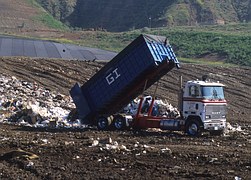Solid Waste Transportation Compliance & Consulting

The New Jersey Department of Environmental Protection (“NJDEP”) regulates, monitors, and enforces a wide range of environmental protection and conservation laws throughout the State of New Jersey. The NJDEP is a cohesive government organization which is involved in various programs and areas of environmental protection including recycling, clean water, air quality and pollution, open spaces, wildlife protection, business regulations, waste transportation and disposal, and other environmental areas.
Waste transportation and disposal is one of the major areas which the NJDEP monitors with the important goals of: eliminating illegal dumping (and thus land and water pollution), eradicating criminal activity from the waste removal industry due to a historic connection between the industry and illegal conduct, and educating waste handlers of relevant rules and environmental impacts.
To achieve these goals, the New Jersey State Legislature and the NJDEP have enacted numerous laws, rules, regulations, and reporting requirements for waste transporters. To start, most waste transporters are required to obtain a New Jersey A-901 license. The process for obtaining an A-901 license is not a quick or easy one. Before ever engaging in any waste transportation, the business must provide a great deal of information to the NJDEP, including the source of funding for the business, business locations, lease and lessor information, identification of owners and key employees, etc. On top of that each key employee, owner, partner, officer, director, and managing member must complete a disclosure form which requires a great deal of specific and detailed information such as information regarding family members, employment history, and other personal details. Moreover, each of these people need to be fingerprinted and have background checks conducted.
More often than not, if the owner(s) of the new waste transportation business has no experience in the industry previously, the NJDEP will require that owner(s) to consult with an attorney familiar with the solid waste industry and/or a solid waste consultant. The attorney or consultant is then required to submit a letter to the NJDEP confirming that he or she is familiar with the laws related to the solid waste industry and have advised the business of its compliance obligations.
A waste transportation business’s compliance obligations may vary based upon what kind of waste is being transported. For instance, most waste transporters must also complete an application for a Certificate of Public Convenience & Necessity (“CPCN.”) A CPCN may only be completed after a waste transportation business has obtained its A-901 license. The CPCN seeks information similar to the A-901 including information regarding owners, locations, key employees, etc. However, septic waste transporters generally need not complete a CPCN application. However, septic waste transporters may have compliance obligations under the Clean Water Act.
Likewise, hazardous and/or medical waste transporters may have additional compliance obligations. Hazardous waste transporters are regulated under the federal Resource Conservation and Recovery Act by the Environmental Protection Agency and the United States Department of Transportation.
Beyond that, there are also local rules and requirements for waste transportation businesses. Each county in New Jersey may establish its own regulations for waste transporters. Generally, the counties dictate which waste facilities transporters can delivery to and what type of waste may be deposited there. Oftentimes, they also set forth transportation routes to be used.
Therefore, with waste transporters unfamiliar with these rules and regulations, the NJDEP has sought to have new transporters become educated about their obligations under New Jersey Solid Waste law prior to beginning operations. McLaughlin & Nardi, LLC’s attorneys are experienced with the laws and regulations in the solid waste industry and can provide consultation services for companies seeking to either begin their new business in the waste transportation industry or companies seeking to improve their operations to ensure compliance obligations are met. To learn more about what we may be able to do to help, please visit our website, www.esqnj.com or contact one of our New Jersey lawyers by e-mail or telephone at (973) 890-0004.
 New Jersey Lawyers Blog
New Jersey Lawyers Blog

